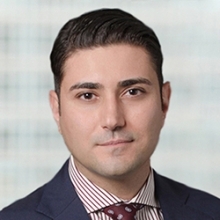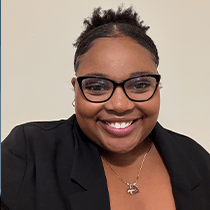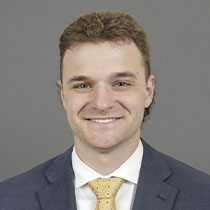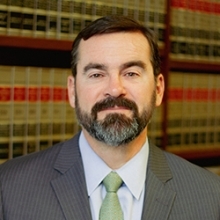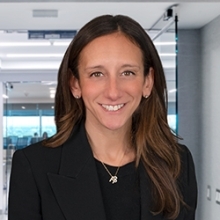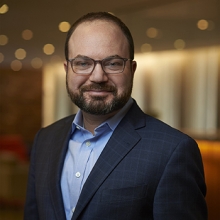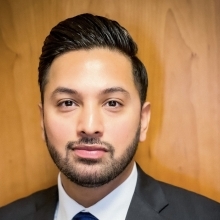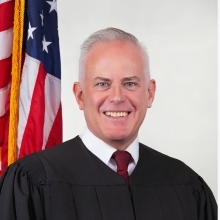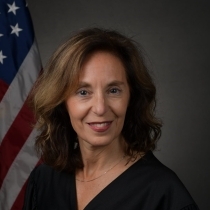Center for Bankruptcy Studies
What We Do
The Center for Bankruptcy Studies is home to all of the Law School's bankruptcy initiatives, including the nation's leading Bankruptcy LL.M. program, the American Bankruptcy Institute Law Review, the Bankruptcy Law Society, and the Bankruptcy Fellowship Program. The Center offers a wide range of programs for students, faculty, alumni, and practitioners throughout the year.
About the Center
A cornerstone of the Center for Bankruptcy Studies’ mission is to offer St. John’s Law students practical, engaging, and worthwhile opportunities in the bankruptcy field, including the:
- Bankruptcy LL.M.: The nation's only LL.M. in Bankruptcy program
- American Bankruptcy Institute Law Review: The leading scholarly journal on bankruptcy law
- Duberstein Bankruptcy Moot Court Competition: The only bankruptcy moot court competition and the largest single-site appellate moot court competition in the nation
- Bankruptcy Law Society: The Center's student organization affiliate, the Bankruptcy Law Society is open to all students interested in bankruptcy and presents special events on current issues in the bankruptcy field
- Advisory Board: Anchoring and overseeing our offerings is an Advisory Board comprised of leading professionals in the field
In connection with the Center and under its auspices, the Law School offers over two dozen specialized bankruptcy courses, the Bankruptcy Advocacy Clinic, and bankruptcy externships and internships. In addition, the ABI Bankruptcy Case Blog and the St. John’s Bankruptcy Research Library offer current research on cutting-edge bankruptcy cases and issues.
Support the Center
To support the Center and its initiatives, please visit the Law School's online giving page or contact Associate Dean for Law School Advancement Brian Woods at [email protected] or 718-990-5792.
Bankruptcy Alumni Spotlight
How did you become interested in bankruptcy practice?
I graduated law school around the time of the 2008 financial crisis and started my career as a litigator. But I had always been drawn to business, and bankruptcy offered a way to bridge those two interests. It combined the analytical and advocacy skills I enjoyed from litigation with the strategic and financial problem-solving that I found fascinating.
Why did you decide to enroll in St. John’s Bankruptcy LL.M. program?
Given the state of the world during the Great Recession, it felt like the right time to pivot and focus on an area that was dynamic and impactful. St. John’s LL.M. program stood out as a prime opportunity to get started on the right foot in bankruptcy. The program provided both substance and access. I could gain real, practical exposure to the law and have the chance to meet and learn from people who were active in the industry.
Which LL.M. courses and opportunities best prepared you for practice?
One highlight was the Amicus Brief Writing course, where I helped draft an amicus brief in U.S. Student Aid Funds v. Espinosa. That experience gave me hands-on exposure to how nuanced bankruptcy issues can be at the highest levels. I also interned for U.S. Bankruptcy Judge (Ret.) Allan Gropper, which allowed me to see cases unfold in real time and tie how the law, case strategy, and courtroom dynamics interplay in practice.
What has been the most exciting part of your career to date?
I’ve enjoyed the variety of experiences I’ve had across different firms and roles. I started my career at Baker Hostetler working on one of the biggest Ponzi scheme cases in history—the Bernard L. Madoff liquidation. Pivoting to Kirkland & Ellis, I gained experience on the company side working on restructurings. I was seconded to the firm’s Special Situations Group and advised the investment desk team on distressed and opportunistic investments. Now, as a partner at Latham & Watkins, I’ve had the opportunity to help build and grow the firm’s restructuring practice alongside an exceptional group of partners. Together, these experiences have given me a true 360-degree view of the practice and business of law.
What advice would you give current law students as they start their careers?
I’d advise them to never stop growing and never stop learning. The most successful lawyers I know are the ones who stay curious and keep finding ways to sharpen their skills and expand their perspective. Don’t be afraid to start in a new area or ask questions that push you to think differently. Approach every challenge with humility and enthusiasm. Especially in restructuring, every case, client, and situation teaches you something new—and that constant evolution is what makes this career so rewarding.
Our Program
Advanced Bankruptcy Research
In this course, students work individually with a professor to produce a substantial, original work of advanced bankruptcy scholarship. The professor will work closely with each student to select the topic, perform the research, and commit the research to writing. Note: For LLM students who opt to continue with Bankruptcy Master’s Thesis, the grade for Advanced Bankruptcy Research may be deferred until completion of the Thesis course, at which time a final grade will be assigned based on the cumulative work of the student in each course. JD students must also satisfy the requirements of Directed Research in order to earn credit for this course and will not be permitted to take this course if they already have taken or plan to take Directed Research. Only two credits toward the JD degree may be awarded for the completion of this course.
Bankruptcy Clerkship Seminar
This seminar examines the role of bankruptcy law clerks with the goal of preparing students to be effective bankruptcy law clerks. Discussion topics will include advice to the new law clerk, an overview of the CM/ECF docketing system, calendar notes and “bench memos,” judicial ethics, opinion writing, reviewing motions, including a discussion of certain common motions, checking service, reviewing, and drafting proposed orders and judgments, the adversary proceeding process, and selected issues in chapter 11 and chapter 13. Students will be required to read and write weekly case summaries of decisions written by their respective judges and become familiar with the local rules and standing orders for their respective districts. The seminar grade is based on class participation and a written bench memo assignment. Schedule permitting, the class will visit the chambers of a bankruptcy judge to view oral argument and meet with the judge.
Bankruptcy Procedure
This course will include simulation and exercises in practice under the Federal Rules of Bankruptcy Procedure. The students will also draft pleadings, discovery requests, orders, and judgments in bankruptcy.
Bankruptcy Sales
This course examines the bankruptcy sale process. The course will cover the basic rules governing bankruptcy sales and will explore the motivations of the parties and creative uses of the sale process. Evaluation will be based on an examination, but class participation or a paper may be factored into the final grade. Pre-requisite for J.D. students: Creditors’ Rights or Business Bankruptcy Reorganizations.
Bankruptcy Taxation
This course will examine the tax aspects of bankruptcy practice. Taxation is a major aspect of many bankruptcy cases and an emerging sub-specialty in the bankruptcy field. The course will consider such areas as the post-confirmation carry forward of losses, and tax planning for entities in financial difficulty. Pre- or co-requisite for J.D. students Tax: Basic Federal Income.
Business Bankruptcy Reorganization
The course examines the reorganization of financially distressed enterprises under Chapter 11 of the Bankruptcy Code and the theoretical and economic underpinnings of reorganization. The course will consider all aspects of Chapter 11 from filing to confirmation of a plan of reorganization, conversion or dismissal. The following topics will be covered: good faith; venue; retention and compensation of professionals; the extent of the court’s equitable powers; use, sale and lease of the debtor’s property; successor liability; post-petition financing.
Complex Bankruptcy Litigation Seminar
This course will examine litigated aspects of fraudulent conveyances, equitable subordination, substantive consolidation, preference proceedings and contested proceedings for confirmation of chapter 11 reorganization plans, and civil RICO, lender, and CERCLA liability. The course will also address ethical issues such as conflicts of interest. Pre-requisite for J.D. students: Creditors’ Rights or Business Bankruptcy Reorganization.
Consumer Bankruptcy
This course will examine Chapter 7 and 13 of the Bankruptcy Code, including the principles of the fresh start and equality of distribution; the roles of the case trustee and United States Trustee; good faith and substantial abuse; the automatic stay; property of the estate; discharge, challenges to discharge and dischargeability; rights to convert and dismiss; bankruptcy petition preparers; and recent research concerning trends and developments in consumer bankruptcy filings.
Creditors’ Rights
This course deals with proceedings to enforce judgments, problems with respect to fraudulent conveyances, alternatives to bankruptcy, and a complete analysis of the Bankruptcy Code. Grades are based upon a final examination.
Directed Research - ABI Law Review
In this course, open exclusively to junior staff members of the American Bankruptcy Institute Law Review, students work individually to prepare a major research paper of advanced bankruptcy scholarship under the direction of a faculty adviser. The faculty advisor will work closely with the student to select the topic, perform the research, and commit the research to writing. To be awarded academic credit, the student shall have produced a final writing of at least 6,700 words in length (approximately twenty-five pages), inclusive of footnotes, that, except for the minimum grade, satisfies the guidelines in place at the time of registration and shall have prepared a detailed outline and have satisfied any other preparatory steps required by the faculty advisor. Pre-requisite: Legal Writing II. As with any course, Directed Research may be taken only once in a student’s academic program.
Drafting Bankruptcy and Commercial Agreements
This practice-oriented course will examine how to draft documents such as agreements pertaining to cash collateral, loans, asset purchases, disclosure statements, reorganization plans and post-petition loans. Pre-requisite for J.D. students: Pre-requisite for J.D. students: Creditors’ Rights or Business Bankruptcy Reorganization.
Executory Contracts in Business Bankruptcy
This course examines the treatment of executory contracts in bankruptcy. The course will cover the basic rules governing assumption, rejection and assumption and assignment, and the course will explore the motivations of the parties. Evaluation will be based on an examination, but class participation may be factored into the final grade. Pre-requisite for J.D. students: Creditors’ Rights or Business Bankruptcy Reorganization.
International Bankruptcy
This course focuses on cross-border insolvency issues that U.S. attorneys confront in practice. The course will study Chapter 15 of the U.S. Bankruptcy Code, including its derivation from the United Nations Commission on International Trade Law's Model Law on Cross-Border Insolvency, and emphasizing its provisions on obtaining U.S. recognition of foreign insolvency proceedings, providing relief to foreign representatives of foreign insolvency proceedings, and protecting the interests of U.S. creditors and those relying on U.S. law in dealing with foreign entities that later become insolvent. In particular, the course will examine the use of Chapter 15 to obtain the enforcement in the U.S. of debt restructuring plans approved by foreign courts. The course will also examine the use of Chapter 11 of the U.S. Bankruptcy Code by entities organized under foreign law to restructure their debts, and consider the extraterritorial aspects of U.S. bankruptcy law, and choice of law issues regarding international transactions and insolvency issues. Finally, the course will consider examples of how other countries' restructuring laws compare and contrast with Chapter 11, such as schemes of arrangement used in the United Kingdom and British Commonwealth countries, and also examine international insolvency regimes, such as the European Union Insolvency Regulation. Grades will be based on class participation and a final examination. Creditors’ Rights or Business Bankruptcy Reorganization is a recommended pre- or co-requisite.
Introduction to Bankruptcy Practice: Case Analysis (for ABI Law Review Members)
This course, open to junior staff members of the American Bankruptcy Institute Law Review, simulates the working environment of a law firm bankruptcy practice group. Students assume the role of entry-level associates who conduct time-sensitive research and writing assignments on cutting-edge bankruptcy issues. Students will thoroughly research the subject of their assigned issue and prepare a first, second and final draft of a comprehensive office memorandum. Each memorandum will be reviewed by the instructor and the instructor’s feedback will guide the student through the revision process. Evaluation will be based on the quality of the research and writing, as well as a brief presentation by the student to the instructor on the student’s research and findings. This course satisfies the JD Advanced Practice Writing Requirement.
Real Estate Workouts & Bankruptcy
This course will examine the consequences of real estate defaults, emphasizing the major current problems faced by real estate mortgagees, landlords, tenants and partners in default situations and mitigating drafting techniques that may be employed in the documentation stage. Among the areas covered will be: negotiating and drafting a workout agreement; lender liability; cram down of bankruptcy plans including classification and "new value" issues; and effect of bankruptcy of a real estate partner. Grades are based upon a research paper and a final examination. Pre-requisite for J.D. students: Creditors’ Rights or Real Estate Finance or Business Bankruptcy Reorganization.
Representing Trustees in Bankruptcy
This course examines current issues that arise in the representation of trustees in the bankruptcy process. Among other issues, the course will examine the powers and duties of a trustee, the role a trustee plays in different contexts, and the relationship between a trustee and the Office of the United States Trustee. The differing powers, duties, and roles of a trustee in Chapter 7, 11, 12 & 13 cases will be explored. Evaluation will be based on an examination, but class participation is required and may be factored into the final grade. Pre-requisite for J.D. students: Creditors’ Rights or Business Bankruptcy Reorganization.
Secured Transactions
In a secured transaction, a borrower gives the lender rights in the borrower's personal property in the event that the loan is not repaid. This course provides broad coverage of the primary pertinent statute, Article 9 of the Uniform Commercial Code, but also gives attention to key related provisions of the Bankruptcy Code. Grades are based upon a final examination.
Securitization, Structured Finance and Capital Markets
This course will examine the legal structure of securitization, a trillion-dollar industry. Securitization is the process by which a company sells its receivables (debts owed to it) to a special purpose entity (SPE) created specifically for that purpose. This form of financing can realize lower interest rates to the company selling the receivables than if the company borrowed against its receivables and kept title. The course will touch on various legal issues raised by this industry, including secured transactions, bankruptcy, corporate finance, securities regulation, corporate governance, and the role that legal opinions play throughout the deal process. The course will be graded based upon an in-class exam (80%) and class participation (20%). Pre-requisite for J.D. students: Creditors’ Rights or Business Organizations or secured Transactions or Business Bankruptcy Reorganization.
Select Topics in Bankruptcy (topics vary)
This course will be offered in the LL.M. Bankruptcy program periodically to explore a topic of major significance to the insolvency community that is not covered sufficiently in some other course. It will be a thorough, in-depth review of the issue and the problems arising therefrom. It will be taught by an expert or experts in the area involved. Students may enroll for multiple "Select Topics" course offerings but may not take the same offering for credit more than once. Evaluation will be based on an examination or paper at the discretion of the instructor (check with the LL.M. office). Class participation is required and may be factored into the final grade. Pre-requisite for J.D. students: Creditors’ Rights or Business Bankruptcy Reorganization.
Small Business Bankruptcy
This course will address and discuss the problems encountered by, and the possible solutions for small business entities (corporations, partnerships, and LLC's) in financial distress. In addition to facing all the same inherent problems that large businesses have in reorganizing and restructuring, small businesses face added burdens with regard to the inherent costs of successful reorganization and access to quality financial and legal advice. Likewise, small business creditors often look at huge write-offs that might be mitigated by a successful reorganization process. The goal is for the students to obtain a thorough understanding of the many issues involved in small business and agricultural bankruptcies. Evaluation will be based on an examination, but class participation may be factored into the final grade. Pre-requisite for J.D. students: Creditors’ Rights or Consumer Bankruptcy or Business Bankruptcy Reorganization.
Valuation & Remedies in Bankruptcy
This course will examine valuation and remedy issues that arise in bankruptcy cases. Topics considered may include valuations in dispute, valuation and finance theory, common methods of valuing a company and other unique assets such as IP, the proper role of the court in valuation disputes, and various remedies that valuation evidence can support, such as unjust enrichment and the avoidance remedies available under Sections 550 and 551 of the Bankruptcy Code. With a dual focus on theory and practice, the course will also include some study of the actual valuation reports submitted and the remedies that resulted in leading valuation cases. Grades will be based on a combination of participation and a research memorandum assignment of approximately 15 pages in length. Pre-requisite: Creditors' Rights.
St. John’s Bankruptcy LL.M. program is the nation's only LL.M. degree program devoted to bankruptcy law. This highly successful program offers a wide array of specialized bankruptcy courses taught by leading practitioners, judges, and academics.
As a student in the Joint J.D./LL.M. in Bankruptcy program, you can complete both your J.D. degree and your LL.M. degree in as few as seven semesters.
The Law School collaborates with the American Bankruptcy Institute (ABI) to publish the American Bankruptcy Institute Law Review. Widely regarded as the nation's premier scholarly bankruptcy journal, the ABI Law Review contains articles and student notes on cutting-edge issues of bankruptcy law and practice.
In addition to its biannual publication, the ABI Law Review helps to organize and run the prestigious Duberstein Bankruptcy Moot Court Competition, the only bankruptcy moot court competition in the nation. The ABI Law Review is responsible for the research and fact patterns that form the basis of the competitors' arguments. Its student members prepare the bench memo for all the competition judges, field two teams that litigate alongside the competitors, and serve as bailiffs in the preliminary rounds.
As part of the ABI Law Review, student members are highly encouraged to author notes on major bankruptcy issues affecting various legal disciplines, as well as interact with ABI leadership in the topic selection for each issue. Student editors and staff have complete control over the editing process.
Jointly sponsored by St. John’s Law and the American Bankruptcy Institute, the annual Duberstein Bankruptcy Moot Court Competition is the nation's only bankruptcy moot court competition and its largest single-site appellate moot court competition. The event is named for distinguished St. John’s alumnus and former ABI Director, Hon. Conrad B. Duberstein '41, '91HON, who passed away in 2005 at the age of 90.
The Center for Bankruptcy Studies' Bankruptcy Law Fellowship Program offers a select group of St. John's Law students an outstanding educational and pre-professional experience.
Students apply for the Program either in the summer as a rising 2L or 3L or during the winter of their 2L year and are admitted through a competitive process. The Program Review Committee selects candidates based on several criteria, including academic performance, a demonstrated dedication to bankruptcy as a career option, and potential benefits to be derived from the program.
The selected Bankruptcy Fellows participate in a unified program of academic and pre-professional instruction designed to prepare them for rewarding careers in bankruptcy law, including bankruptcy-focused externships, mentoring and clinical programs. They engage with the Center's strong alumni network, build connections in the bankruptcy industry, and participate in, and assist with, the Center's networking events, conferences, seminars, continuing legal education programs, and other initiatives.
Bankruptcy Fellows must complete at least 15 credits comprised of core foundation courses, elective courses from advanced J.D. and Bankruptcy LL.M. courses, and an experiential requirement. In addition to receiving preferential access to limited-enrollment elective courses, they benefit from the guidance of the Center's Director, a dedicated Career Development Counselor with expertise in bankruptcy career options. The Director works closely with Bankruptcy Fellows as they make decisions regarding curriculum, publications, internships, externships, and long-term career planning.
St. John's Law students can gain hands-on experience in, and practical knowledge of, bankruptcy law by participating in the Bankruptcy Law Society (BLS). Throughout the academic year, BLS holds regular meetings and hosts special events where distinguished judges and practicing attorneys address current issues in the field of bankruptcy. It also offers students membership in the American Bankruptcy Institute and the Turn Around Management Association.
The Bankruptcy Advocacy Clinic is a full-year clinic offered in partnership with Legal Services NYC, the largest U.S. organization devoted exclusively to providing free civil legal services to low-income people.
The Center for Bankruptcy Studies collaborates closely with the Law School's Externship Program to place students in externships where they work directly with an assigned mentor attorney on bankruptcy-related matters. Externship placements span the legal spectrum and include work in public interest organizations, governmental agencies, private law firms, judicial chambers, and corporate legal offices.
Summer Public Interest Fellowships
In collaboration with the Law School's Public Interest Center, the Center for Bankruptcy Studies awards a Summer Public Interest Fellowship to a rising 2L or 3L to support their summer work with with nonprofit and governmental organizations that assist traditionally underrepresented clients, groups, or interests relevant to bankruptcy law.
Past Recipients
2024: Theodore (Ted) X. Chritton '26, Hon. Alan S. Trust, Chief Judge, U.S. Bankruptcy Court, Eastern District of New York
2023: Erenada Pantazi '25, Hon. Jil Mazer-Marino '90, U.S. Bankruptcy Court, Eastern District of New York
Bankruptcy LL.M. Scholarships
There is a limited, partial scholarship fund available to St. John's Bankruptcy LL.M. students, who are awarded scholarships based on their credentials, potential for success, and need. To apply for a scholarship, students should submit a letter to the Bankruptcy LL.M. Program Director detailing how they meet the selection criteria.
Outside Scholarships and Awards
Federal Bar Association EDNY Chapter Bankruptcy Section Student Scholars Program
Past Scholars
2024: Salvatore Salerno '24, "Tax or Penalty: The Interplay Between Sebelius and Priority Status in Bankruptcy"
Turnaround Management Association Hon. Dorothy T. Eisenberg Women in the Law “Trailblazer” Award
Past Recipients
2024:
- Myah Drouin '24
- Amanda Gazzo '24 (finalist)
2023: Annmarie Gruick '24
2024
ABI Law Review Alumni Reception
Past and present members of the Law School's ABI Law Review came together for an evening of mixing and mingling and to remember the journal's founder, the late Professor Robert Zinman. Jeffrey Cohen '00 and other ABI Law Review Alumni generously hosted the event at their law firm, Lowenstein Sandler.
Fall Welcome Reception
Students, including the Center's Bankruptcy Law Fellows, members of our Bankruptcy Law Society, and members of the ABI Law Review, gathered to celebrate the start of another year of bankruptcy law programming.
Women in Bankruptcy Panel and Networking Reception
Panelists
- Hon. Jil Mazer-Marino '90, U.S. Bankruptcy Court, Eastern District of New York
- Nancy Bello '16, Senior Associate, Kramer Levin Naftalis & Frankel LLP
- Shara Cornell '11, LL.M. ’12, Trial Attorney, Office of the U.S. Trustee
- Maria DiConza '97, Partner, O’Melveny & Myers LLP
2023
What Every Attorney Needs to Know About Bankruptcy Law But is Afraid to Ask
Panelists
- Hon. Alan S. Trust, Chief Judge, U.S. Bankruptcy Court, E.D.N.Y.
- Elizabeth M. Aboulafia '08, Partner, Cullen & Dykman LLP
- Sheryl P. Giugliano '08L, '09LL.M., Partner, Ruskin Moscou Faltischeck, P.C.
Moderator
Laura B. Schwartz '90, Director, St. John’s Law Center for Bankruptcy Studies and Career Development
Co-Sponsors
Federal Bar Association, Eastern District of New York Chapter
St. John's Bankruptcy Law Society
Bankruptcy Law Alumni Reception: Celebrating the 30th Anniversary of the ABI Law Review
Honoree
Thomas Michael Horan '04, U.S. Bankruptcy Judge, District of Delaware
Our Leadership
Laura B. Schwartz
8000 Utopia Parkway, Queens, NY 11439
[email protected]
(718) 990-5309
Laura Schwartz is a 1990 St. John’s Law graduate. As a student, she served on the St. John’s Law Review and, after graduation, she was a commercial litigator at two major New York law firms for 10 years. Redirecting her practice, she joined the bankruptcy and restructuring department at another top firm, where she represented debtors, creditors, and creditors’ committees in the full range of bankruptcy matters.
With 15 years of experience in the field, Laura left private practice to join an executive legal search firm, where she conducted searches for law firms and corporations in all substantive areas of the law, with a concentration in bankruptcy placements. In 2011, she returned to St. John’s to work in the Law School’s Career Development Office, specializing in counseling J.D. and LL.M. students interested in pursuing a career in bankruptcy and restructuring law and commercial litigation.
In 2023, Laura took on the role of Director of the Center for Bankruptcy Studies and Career Development. As Director, she coordinates the Center’s programs and initiatives; collaborates with alumni and others in the bankruptcy field to maintain and develop connections with St. John’s Law and its students; and works with students to help them achieve their career goals. She also co-manages St. John’s Bankruptcy LL.M. program, which includes curriculum oversight, adjunct faculty recruitment, and admissions decisions.
In addition to leading the Center, Laura is an adjunct professor at St. John’s Law and serves as faculty advisor to the Bankruptcy Law Society and co-faculty advisor to the Moot Court Honor Society.
Laura has been admitted to practice law in New York and Connecticut and before the Second Circuit Court of Appeals and the Southern and Eastern Districts of New York.
The Center for Bankruptcy benefits from the support and guidance of a distinguished Advisory Board, which includes these leaders in the field:
Nancy Bello ‘16, Senior Associate, King & Spalding
- Jeffrey Cohen ‘00, Partner & Chair, Bankruptcy & Restructuring Department, Lowenstein Sandler
- Douglas E. Deutsch ‘96L, ‘01LL.M., Partner, Clifford Chance US LLP
- Gerard DiConza ‘94, Partner, Archer & Greiner PC
- Sheryl P. Giugliano ‘08L, ‘10LL.M., Partner, Ruskin Moscou Faltischek, P.C.
- Kristin Going ‘02LL.M., Partner, McDermott Will & Emery
- Carrie Hardman ‘09L, ‘13LL.M., Partner, Winston & Strawn LLP
- Hon. Thomas M. Horan ‘04, Judge, U.S. Bankruptcy Court, District of Delaware
- John Longmire ‘95, Partner (ret.), Willkie Farr & Gallagher LLP
- Gerard R. Luckman ‘93, Partner, Forchelli Deegan Terrana LLP
- Hon. Jil Mazer-Marino ‘90, Judge, U.S. Bankruptcy Court, Eastern District of New York
- Varinder Singh, B.S. ‘14C, ‘19L, ‘20LL.M., Associate, Otterbourg P.C.
- Francisco Vazquez ‘94, Senior Counsel, Norton Rose Fulbright US LLP
To learn more about the Center for Bankruptcy Studies and its Advisory Board, please email [email protected]
At St. John’s Law, bankruptcy courses are taught by a renowned faculty including bankruptcy scholars, judges, and seasoned practitioners with experience in a variety of areas of bankruptcy law.
Full-Time Faculty:
Adjunct Faculty:
- Elizabeth Aboulafia ’08, Partner, Cullen & Dykman
- Catherine Christensen, Career Clerk, U.S. Bankruptcy Court, Eastern District of New York
- Jeffrey Cohen ’00, Partner & Chair, Bankruptcy & Restructuring Department, Lowenstein Sandler
- Richard Corbi ‘07LL.M., Corbi Law
- Gerard DiConza ’94, Partner, Archer & Greiner PC
- John Ford Elsaesser, Senior Partner, Elsaesser Jarzabek Anderson Elliott & Macdonald
- Kristin Going ‘02LL.M., Partner, McDermott Will & Emery
- Christopher F. Graham, Partner, Eckert Seamans Cherin & Mellott, LLC
- Sheryl Giugliano, ‘08L,‘10LL.M., Partner, Ruskin Moscou Faltischek, P.C.
- Hon. Thomas M. Horan ’04, Judge, U.S. Bankruptcy Court, District of Delaware
- Richardo I. Kilpatrick, President, Kilpatrick & Associates, P.C.
- Erik Klingenberg, Partner, Dentons
- John Longmire ’95, Partner (ret.), Willkie Farr & Gallagher LLP
- Hon. Jil Mazer-Marino '90, Judge, U.S. Bankruptcy Court, Eastern District of New York
- Alec P. Ostrow, Partner, Becker, Glynn, Muffly, Chassin & Hosinski LLP
- Hon. Karen B. Owens, Judge, U.S. Bankruptcy Court, District of Delaware
- Matthew Roseman, Partner, Cullen & Dykman
- Hon. Brendan Linehan Shannon, Judge, U.S. Bankruptcy Court, District of Delaware
- Hon. Alan S. Trust, Chief Judge, U.S. Bankruptcy Court, Eastern District of New York
- Francisco Vazquez ’94, Senior Counsel, Norton Rose Fulbright US LLP
- Evan Zucker ’08, Counsel, Blank Rome
Elaysha Brown ‘27
Elaysha is a second-year student at St. John’s Law. She serves as a staff member on the Journal of Civil Rights and Economic Development, a junior staff member of the Dispute Resolution Society, and the event coordinator for the Black Law Students Association. A Georgia native, she earned her B.A. in Sociology and African American Studies, with a minor in Law, from the University of Georgia in May 2024. This past summer, Elaysha served as a judicial intern for Hon. Jil Mazer-Marino, U.S. Bankruptcy Court, Eastern District of New York. As a Bankruptcy Fellow, she looks forward to introducing more students to the field of bankruptcy law by assisting the Center in planning and organizing events.
Alyssa DiBenedetto ‘26
Alyssa is a 3L and returning Fellow for the Center for Bankruptcy Studies. She currently serves as the Editor-in-Chief for the American Bankruptcy Institute Law Review, a Senior Staff Member for the Commercial Division Online Law Report, and a Senior Staff Member for the Polestino Trial Advocacy Institute. She graduated from Stony Brook University in 2022 with a B.S. in Business Administration and History, with a minor in Political Science. During her 2L year, Alyssa served as a judicial extern with Hon. David S. Jones, U.S. Bankruptcy Court, Southern District of New York. She was also selected as a recipient for the 4th Annual Hon. Dorothy T. Eisenberg Women in the Law Trailblazer Award by the Long Island Chapter of the Turnaround Management Association and as a scholar for the Federal Bar Association Bankruptcy Scholars program. This past summer, Alyssa interned with the U.S. Bankruptcy Court for the District of Delaware as the Hon. Thomas L. Ambro Fellow. She is excited to be returning back to Delaware after graduation as a Term Law Clerk to Hon. Thomas M. Horan ’04, U.S. Bankruptcy Court, District of Delaware. As a Bankruptcy Fellow, she looks forward to planning programs for the Center and networking with practitioners in the bankruptcy field.
Tyge Duffy ‘26
Tyge, a third-year student at St. John’s Law, serves at the Executive Articles Editor for the American Bankruptcy Institute Law Review. He graduated magna cum laude from St. John’s University’s Tobin College of Business in 2021 with a B.S. in Economics. During his second year at St. John’s Law, Tyge was a legal extern in the Bankruptcy Unit of the Securities and Exchange Commission’s Division of Enforcement. He spent this past summer interning with Hon. Sean H. Lane, U.S. Bankruptcy Court, Southern District of New York, and will continue in that role through the fall semester. As a Bankruptcy Fellow, he looks forward to growing the bankruptcy community at St. John’s and planning events for the Center for Bankruptcy Studies.
Megan Russelman ‘26
Megan is a 3L at St. John’s Law and currently serves as the Director of Special Events for the Polestino Trial Advocacy Institute and as a Senior Staff Member of the St. John’s Law Review. She graduated from Villanova University with a Bachelor of Arts in Economics and a minor in Political Science. During her second year at St. John’s, Megan was selected as a Scholar for the Federal Bar Association Bankruptcy Division Student Scholars program. This past summer, she worked at Anderson Kill as a Summer Associate and has accepted an offer to return as an Associate after graduation. During the upcoming fall semester, Megan is excited to work as a Judicial Extern for Hon. David S. Jones, U.S. Bankruptcy Court, Southern District of New York. As a bankruptcy fellow, she looks forward to taking more advanced bankruptcy classes, working on exciting events with the Center, and networking with bankruptcy professionals.
Kayla Zorn ‘26
Kayla is a third-year student at St. John’s Law, where she serves as President of the Student Bar Association, Associate Managing Editor of the Journal of Civil Rights and Economic Development, and Co-President of the Corporate and Securities Law Society. She graduated cum laude from Fordham University in 2023 with a B.A. in Economics and International Political Economy and a minor in Business Administration. During her 2L year, Kayla gained experience in bankruptcy externing with Hon. Jil Mazer-Marino, U.S. Bankruptcy Court, Eastern District of New York, and working at Anderson, Bowman Wallshein, PLLC. This past summer, she was a Summer Associate at Cullen and Dykman LLP. This year, Kayla is looking forward to joining the Bankruptcy Advocacy Clinic and taking more classes through the Bankruptcy LL.M. program. As a Bankruptcy Fellow, she is excited to help plan programs, build connections between students and alumni, and strengthen the St. John’s bankruptcy community.
Alumni Spotlight Archive
Sean Southard ‘97C, ‘00L
Partner, Klestadt Winters Jureller Southard & Stevens, LLP
When did you know you wanted to pursue a career in bankruptcy law?
I knew I was interested in bankruptcy law by the beginning of my third year at St. John’s Law. At that point, I had served as an ABI Law Review staff member and had taken a very interesting Real Estate Workouts course with the one and only Professor Bob Zinman.
Did any other Law School courses, clinics, or experiences spark your interest in bankruptcy law?
In addition to Real Estate Workouts, I took Creditors Rights and Commercial Transactions as a 2L and then took Business Bankruptcy Reorganizations, Bankruptcy Procedure, and other LL.M. level courses in my 3L year (when the Law School’s Bankruptcy LL.M. program launched). Those courses, together with my ABI Law Review experience and internship with Hon. Cornelius Blackshear in the U.S. Bankruptcy Court, affirmed my interest in bankruptcy law.
What has been your career path since graduating from St. John’s?
I’m unusual and somewhat unique nowadays in that I’ve always worked at some incarnation of my current boutique bankruptcy firm. When I started out of law school, I was one of just four attorneys at the firm and expected a rather short stay. I was elevated to partner in 2006, when the firm was known as Klestadt & Winters, LLP, and became an equity owner in 2015, when the firm’s masthead changed to Klestadt Winters Jureller Southard & Stevens, LLP.
What has surprised you about your career so far?
When I started out 25 years ago, restructuring practice was different. Cases were slower to progress and attorneys spent time trying to fix debtor operations. But, as the cost of the Chapter 11 process rose, we had to adapt and craft new service offerings to meet market demands. I also continue to be surprised at how small the restructuring world is, and how many connections exist among professionals who practice in this area. One thing that doesn’t surprise me is how many successful St. John’s Law graduates inhabit the restructuring world.
What do you enjoy most about restructuring?
I’ve always enjoyed the variety that comes with restructuring work. Analyzing new and different businesses and industries throughout my career has helped to keep me interested and engaged in the work. Some other areas of the law are much more cookie cutter and tend toward the mundane. Restructuring is always evolving, and financial distress moves through different industries and areas of the market. We follow its path and learn as much as we can about each area and the applicable laws.
What advice would you give to current law students?
I’d tell them networking is more important than you know—and can take many forms. Being smart and doing well in law school is only the beginning. Building a reputation and resume you can be proud of, and establishing a large network of relevant contacts, are key to financial success.
Sheryl Giugliano ‘08L, ‘10LL.M.
U.S. Bankruptcy Judge, Eastern District of New York (September 2025)
When did you know you wanted to pursue a career in bankruptcy law?
I went to law school because I was interested in the law, believed in the pursuit of justice, and never wanted to be bored. When I discovered bankruptcy law and the practice’s many facets as a 2L on the ABI Law Review, I knew I had found my calling.
What experiences at St. John’s helped shape your career?
My law school professors taught me that a legal career is truly a profession, and that bankruptcy in particular is like a “bowl of spaghetti” to unravel – i.e., bankruptcy lawyers specialize in mess. In the St. John’s Bankruptcy LL.M. program, I learned that my professional reputation takes a career to build, but just one bad decision to destroy. One of my LL.M. professors, Adam Rosen, became my mentor and friend, and now serves as a sounding board when I need help with difficult cases.
What has your career path been since graduating law school?
I think my career path has been unusual. I worked for a small commercial real estate firm while completing my LL.M and then joined a boutique firm on Long Island, where I worked almost exclusively on chapter 11 debtor cases for six years. Following mentors to the New York office of a Texas based firm, I gained wonderful experience in national bankruptcy litigation. From there, I joined Ruskin Moscou Faltischek, P.C. Over my five years at RMF, along with a team of talented and collaborative attorneys, I’ve expanded the firm’s bankruptcy and restructuring practice. I had my second child as a RMF partner and feel lucky to be a working mom in such a supportive environment.
Why did you decide to apply for the bench?
I first considered applying for the bench after attending “Who Me, a Bankruptcy or Magistrate Judge?”— a Federal Judiciary program intended to increase diversity on the bench.I learned that there’s no single path to becoming a judge. A few years later, I was fortunate enough to serve on the planning committee for the same program and witnessed how life-changing it can be for young lawyers. I ultimately decided to apply because I think serving as a bankruptcy judge offers a unique and special opportunity to fulfill my civic duty; administer justice in an efficient, fair, and impartial manner; and continue to learn and teach bankruptcy law.
Which aspect/s of being a judge are you most looking forward to?
I look forward to serving the public and the bar in an efficient and effective manner and hopefully making the Eastern District and Second Circuit proud. I hope to move cases forward in a manner that gives parties an opportunity to be heard. Last, I’m excited to join the collegial environment that seems to exist on the bench.
What has surprised you the most about your career so far?
I couldn’t have imagined how much I would enjoy being a bankruptcy lawyer. It’s stressful and challenging, but it’s also rewarding and a lot of fun. I love the fast-paced, creative, and collaborative nature of chapter 11 work—both debtor and creditor side. I also like being part of the close-knit bankruptcy bar and appreciate the opportunities I have to teach at St. John’s Law, lead committees of incredibly talented and experienced bankruptcy lawyers, and represent businesses in their times of need.
What advice do you have for current law students interested in a career in bankruptcy?
I was once told that law school was an investment in my future, and it was. But I think that investment is ongoing. The benefits may not be immediately apparent, but they are there and if you keep working towards your career goals, you can achieve them.
Nancy Bello ‘16
Senior Associate, King & Spalding LLP
When did you know you wanted to pursue a career in bankruptcy law?
I certainly did not go to law school expecting to pursue a career in bankruptcy! While a student at St. John’s Law, I developed an interest in bankruptcy through my involvement with the American Bankruptcy Institute (ABI) Law Review, as well as by taking numerous bankruptcy courses.
What experiences at St. John’s helped shape your career?
Accepting the offer to join the ABI Law Review was one of the most influential decisions of my life. Not only did it invoke my interest in bankruptcy law, but it also introduced me to a wonderful network of alumni who have been instrumental in my professional development. I also truly enjoyed the bankruptcy courses I took at St. John’s Law. In particular, I had the privilege to learn about executory contracts and bankruptcy sales from the Honorable Judge Shannon and the late Honorable Judge Carey from the U.S. Bankruptcy Court for the District of Delaware. I will also never forget attending the ABI Spring Conference in Washington, DC with Professor Ray Warner—it really opened my eyes to the closeness of the restructuring community.
What has your career path been since graduating from St. John’s?
Following graduation, I began my career as a restructuring associate at Fried, Frank, Harris, Shriver & Jacobson LLP. At the start of my third year of private practice, I joined the bankruptcy and restructuring department at Kramer Levin Naftalis & Frankel LLP. I recently lateraled to join the financial restructuring group at King & Spalding LLP, where I represent creditors, debtors, and other parties in interest in chapter 11 cases and out of court restructurings.
What has surprised you the most about your career so far?
The practice is constantly evolving. For the last few years, we have been experiencing a rise in out of court restructurings and liability management exercises. It is important to always adapt to best serve your clients and stay relevant.
What advice do you have for current law students interested in a career in bankruptcy?
Take advantage of the St. John’s Law alumni network! We are always happy to be a resource.
John Longmire ‘95
Partner (ret.), Willkie Farr & Gallagher LLP
What has your career path been since graduating from St. John’s Law?
After graduation, I worked full time at Willkie Farr & Gallagher, where I had been a summer associate. I left Willkie in 1996 to clerk for Hon. Raymond Dearie ‘69, '08HON—an incredible mentor, teacher and jurist—in the U.S. District Court for the Eastern District of New York. After my clerkship, I returned to Willkie and spent the rest of my career there. I’m now retired and will teach at the Law School in the fall, among other projects.
When did you know you wanted to pursue a career in bankruptcy?
Very early on at Willkie, I had the good fortune of being assigned to several bankruptcy cases as a litigator. I found the work very compelling and soon switched departments to work on bankruptcy matters full time. Bankruptcy practice is fast paced, incredibly varied, and fascinating. It’s about solving complex, multi-dimensional problems, often during times of crisis, and moving on quickly to the next ones. It allows lawyers to become deeply ensconced with their clients, and to learn how businesses work from the inside. It’s interdisciplinary, in the sense that it requires the ability to understand and operate simultaneously in the worlds of courtroom litigation and transactional deal making, addressing issues related to real estate, tax, securities, and labor and employment law.
What advice would you offer current law students as they start their careers?
I would share that it’s important to get as broad a background as possible. Take classes in different areas, be curious, ask questions, learn everything you can. You won’t just be a specialist. Your job will be to solve your client’s problems and help them achieve their goals. The broader your knowledge, the more value you can add.
What has been the most exciting part of your career?
I’ve enjoyed many of the transactions and cases I’ve worked on, and the relationships I’ve built with clients and other professionals along the way. Helping clients negotiate complex, difficult situations in productive ways can be very satisfying.
How have your years of practice in the field changed your perspective on bankruptcy?
Bankruptcy is an incredible tool within our legal and economic systems that allows us to revitalize distressed companies, save jobs, and maximize value. Practicing in this area has been incredibly rewarding.
Carrie Hardman ‘09L, ‘13LL.M.
Partner, Winston & Strawn LLP
Which law school courses, clinics, or experiences sparked your interest in bankruptcy law?
Property I with the late Professor Zinman sparked my interest in bankruptcy law. He would tell the class “this will not be on the test” and then say how everything he just explained was turned on its head in bankruptcy. Can’t assign a particular lease under state law? Well, you can in bankruptcy. Professor Zinman’s love of bankruptcy was infectious, and I know I’m not the only one who caught his “bug.”
What is the most exciting part of your work in bankruptcy and restructuring?
The excitement is in the variety of matters I handle day to day and year to year. I’ve worked on municipal restructurings, aircraft restructurings, hospital and other healthcare system restructurings, and now on some asbestos bankruptcy cases. I get the chance to challenge myself intellectually every single day.
Do you find any industry more interesting, or more tricky, to handle?
Each industry is unique, which is part of the fun. I’ve learned about pressures facing tow trucking companies, and about companies that supply replacement parts for old, but serviceable, U.S. military planes that transport machinery around the world. So, I wouldn’t say any one industry is trickier. I’m a nerd for learning, through and through, and find even the most expectedly mundane industries fascinating.
What advice would you give to current law students as they start their careers?
I would say: take every single opportunity that comes your way, unless you know it’s absolutely wrong for you. If you’re unsure, say yes. Try it. No decision is forever, and the more you say yes, the more doors you’ll open for yourself.
How did your time as a law clerk shape your career, and what advice do you have for students who are clerking after graduation?
Clerking for Judge Drain has been a highlight of my career thus far. I learned a lot about bankruptcy practice by observing behind the bench and in chambers, and those lessons inform my own practice today. I think everyone should work for the government or for a nonprofit at some point in their career, as it instills a sense of civil mindedness that you can’t get in private practice. I suggest that students clerking after graduation soak up any and all opportunities in chambers. Your clerkship year goes by quickly, so use the time wisely.
Jeffrey Cohen ‘00
Partner and Chair, Bankruptcy & Restructuring Department, Lowenstein Sandler
Which law school courses, clinics, or experiences sparked your interest in bankruptcy law?
Serving as an editor on the ABI Law Review sparked my interest in bankruptcy law. I attended law school focused on litigation, aiming to spend as much time in court as possible. Discovering that bankruptcy law was essentially "litigation for people with immediacy issues" captivated me. I'm grateful to Professor Bob Zinman (may he rest in peace), who personally helped me secure my first job as a bankruptcy associate at a major law firm.
What is the most exciting part of your job working in bankruptcy and restructuring?
I enjoy the challenge of learning new industries every few years. Although legal issues are similar, the unique circumstances of each industry keep things interesting. My 25-year career reflects this, encompassing experiences from the California energy crisis and telecom bust to periods of retail distress, unsuccessful technology ventures, waves of de-SPAC transactions, and the timeline continues. Additionally, pulling the proverbial "rabbit out of the hat" often occurs in chapter 11. While there are many instances where a Hail Mary fails, there are also cases in which the dedicated efforts of skilled restructuring professionals save thousands of jobs or fully repay creditors when least expected. I’m passionate about striving for those outcomes, regardless of how bleak a case may seem at the beginning.
What advice would you give to current law students as they start their careers?
My advice is that I wouldn't start your law career with preconceived notions about which practice area you’re meant to thrive in. When I started at St. John’s, I knew nothing about bankruptcy law, and I didn't know much about it when I graduated, either. My first law firm made me an offer to work in their bankruptcy department, and I gave it a shot. Twenty-five years later, it's where I remain, thrive, and belong.
How did you get involved with distressed company-side representations?
I'm grateful to work at Lowenstein Sandler, where skilled lawyers engage in sophisticated work. Sometimes, our clients face distress and need to evaluate strategic options. In these moments, I work with my partners to guide the board of directors, advising them on fiduciary duties and doing my best to help them avoid Chapter 11 filings. If filing is necessary, we're prepared to represent them. But my primary goal is to assist the board in getting the train back on track without filing Chapter 11 and helping the company position itself for future success. These are challenging times for boards. I'm often the last person they want to meet, but I pride myself on tactfully and elegantly parachuting into those situations.
Gerard Luckman ’93
Partner and Chair, Bankruptcy and Corporate Restructuring Practice Group, Forchelli Deegan Terrana LLP
Which law school courses, clinics, or experiences sparked your interest in bankruptcy law?
Serving as an editor on the ABI Law Review sparked my interest in bankruptcy law. I attended law school focused on litigation, aiming to spend as much time in court as possible. Discovering that bankruptcy law was essentially "litigation for people with immediacy issues" captivated me. I'm grateful to Professor Bob Zinman (may he rest in peace), who personally helped me secure my first job as a bankruptcy associate at a major law firm.
What is the most exciting part of your job working in bankruptcy and restructuring?
I enjoy the challenge of learning new industries every few years. Although legal issues are similar, the unique circumstances of each industry keep things interesting. My 25-year career reflects this, encompassing experiences from the California energy crisis and telecom bust to periods of retail distress, unsuccessful technology ventures, waves of de-SPAC transactions, and the timeline continues. Additionally, pulling the proverbial "rabbit out of the hat" often occurs in chapter 11. While there are many instances where a Hail Mary fails, there are also cases in which the dedicated efforts of skilled restructuring professionals save thousands of jobs or fully repay creditors when least expected. I’m passionate about striving for those outcomes, regardless of how bleak a case may seem at the beginning.
What advice would you give to current law students as they start their careers?
My advice is that I wouldn't start your law career with preconceived notions about which practice area you’re meant to thrive in. When I started at St. John’s, I knew nothing about bankruptcy law, and I didn't know much about it when I graduated, either. My first law firm made me an offer to work in their bankruptcy department, and I gave it a shot. Twenty-five years later, it's where I remain, thrive, and belong.
How did you get involved with distressed company-side representations?
I'm grateful to work at Lowenstein Sandler, where skilled lawyers engage in sophisticated work. Sometimes, our clients face distress and need to evaluate strategic options. In these moments, I work with my partners to guide the board of directors, advising them on fiduciary duties and doing my best to help them avoid Chapter 11 filings. If filing is necessary, we're prepared to represent them. But my primary goal is to assist the board in getting the train back on track without filing Chapter 11 and helping the company position itself for future success. These are challenging times for boards. I'm often the last person they want to meet, but I pride myself on tactfully and elegantly parachuting into those situations.
Gerard (Gerry) DiConza ’94
Partner, Archer & Greiner P.C.
When did you know you wanted to pursue a career in bankruptcy?
I became interested in bankruptcy after I joined the staff of American Bankruptcy Institute Law Review as a 2L. I was immersed in bankruptcy and related areas of law and gained tremendous experience writing and editing articles on hot-button bankruptcy issues. My work on the ABI Law Review impressed Hon. Francis Conrad, who hired me as a Bankruptcy Court intern. Those experiences led to a summer job at Togut, Segal & Segal, a pre-eminent bankruptcy boutique. When I was a 3L, I served as an editor of the ABI Law Review and, after graduation, I clerked for a bankruptcy judge.
Which law school courses and experiences helped you with your career?
Helpful courses included Property I and II (with the late Professor Zinman, who added a touch of real estate finance and distress to the course work), Creditors’ Rights, Commercial Transactions, Business Organizations, Tax, Federal Jurisdiction, and Constitutional Law. Formative experiences included my involvement with the ABI Law Review, the Bankruptcy Law Society, and the Duberstein Moot Court Competition.
What is the most exciting part of your job?
The most exciting part of my bankruptcy practice is finding practical solutions to reorganizing struggling companies, in and out of court. Restructuring a company, by reorganizing its capital structure or selling its valuable assets, can save assets, products, services, and jobs, which is not only exciting, but truly satisfying.
What has surprised you about your career so far?
I’ve been surprised by the collegiality of the bankruptcy bar and other professionals working in the restructuring practice. Everyone knows everyone, and most restructuring professionals are extremely smart, hardworking, and down-to-earth good people.
Do you have any predictions for the bankruptcy industry over the next year?
With interest rates remaining stubbornly high and no sign of inflation moderating, I believe bankruptcy lawyers will be very busy over the next several years.
What advice would you give current law students interested in bankruptcy?
I would tell them to join the Bankruptcy Law Society and take as many bankruptcy courses as possible. St. John’s offers introductory bankruptcy courses and advanced courses for J.D. and LL.M. students taught by esteemed practitioners and judges. Students should write articles on bankruptcy topics. They should expand their networks by working on the Duberstein Moot Court Competition, where they can network with practitioners and judges in the field. Students should also seek internships with bankruptcy judges, many of whom regularly hire St. John’s Law students.
Christine Azzaro ‘01
Career Law Clerk, Hon. Sean H. Lane, U.S. Bankruptcy Court, Southern District of New York
What has been your career path since graduating from St. John's Law?
My career path has been a bit out of the ordinary. I spent the first few years as an associate at large law firms, first in finance practice and then in bankruptcy practice. I left the private sector for what I thought would be a one-year clerkship with a bankruptcy judge. But that first courthouse job turned into 20 years of clerking for three different bankruptcy judges in the Southern District of New York.
Why did you decide to clerk?
As a law firm associate, I interacted with bankruptcy court law clerks and deputies on administrative issues and with judges during hearings. But I wanted more insight into what went on behind the scenes at the courthouse. I felt that clerking would make me a more well-rounded practitioner. I ended up loving it and have been clerking ever since.
How did working in Big Law help you transition to clerking?
My early practice experience was key to my success as career law clerk. Bankruptcy is a specialized practice combining aspects of corporate law, litigation, and other practice areas. Since I was already familiar with the nuances of bankruptcy practice, there was less of a learning curve when I started clerking. It also helped that that I knew what it was like to appear as an attorney in bankruptcy court.
What is the most exciting part of your job?
I find the constant variety of cases that come through the door exciting— from large corporate debtors to individual consumer filings and everything in between. I’ve worked on cases across industries, including retail, healthcare, transportation, and telecommunications. I also enjoy that, as a bankruptcy clerk, I’m a bit of a generalist. About half of the cases I work on solely involve bankruptcy law issues, while the rest involve issues as varied as New York State partnership law and the interpretation of collective bargaining agreements under the Railway Labor Act.
What has surprised you about your career?
I’m surprised by how quickly the years have passed and how many personal and professional connections I’ve made. I’ve worked with many wonderful, talented co-clerks and student interns over the years, many of whom I now consider close friends. A lot of our interns have become bankruptcy practitioners, and it’s great to know that their experience in chambers played a part in shaping their careers.
Varinder P. Singh, B.S. ‘14C, ‘19L, ‘20LL.M.
Associate, Restructuring and Bankruptcy Department, Otterbourg P.C.
When did you know you wanted to pursue a career in bankruptcy?
At St. John’s Law, I balanced my time as a part-time student, managing my business during the day and attending classes at night. This dual experience deepened my appreciation for the intersection of business and law. My Creditors’ Rights course helped me realize that bankruptcy law is a perfect combination of my passion for business and the legal field. What fascinates me most about bankruptcy is its multidisciplinary nature. I consider bankruptcy practitioners to be “generalized specialists,” as this field uniquely allows the application of skills learned from all areas of law. Bankruptcy enables me to leverage my legal knowledge while engaging with a variety of industries and business operations, making the work both dynamic and intellectually rewarding.
Which courses, or experiences at St. John’s helped you with your career in bankruptcy?
St. John’s offers over 15 bankruptcy courses taught by experienced practitioners and judges, all of which I completed. The bankruptcy curriculum is broad, including general courses such as Chapter 11 Reorganization and very specific topics, like Bankruptcy Procedure. These courses equipped me with essential skills, making my transition into legal practice much smoother.
What is the most exciting part of your job?
I really enjoy the variety of cases I work on and the different hats I wear as an attorney, whether representing creditors’ committees, secured and unsecured creditors, or serving fiduciaries such as court-appointed receivers. Each case brings unique opportunities to work with different constituents, learn different areas of law, and overcome challenges. My position requires strategic thinking and adaptability, which keeps the work fresh and exciting.
What has surprised you about your career so far?
What has surprised me the most is the close-knit professional relationships that I have developed with my colleagues. The bankruptcy community is incredibly supportive, especially St. John’s alumni, who go out of their way to offer guidance and assistance.
How has clerking in the U.S. Bankruptcy Courts helped you in your career?
I highly recommend clerking to anyone who wants to develop their skills as an attorney and support our justice system. Being a law clerk to three U.S. Bankruptcy Judges sharpened my technical research and writing skills and allowed me to gain invaluable insights into how the Bankruptcy Courts address complex legal issues. I also developed deep, long-lasting relationships with the judges I clerked for.
What advice do you have for current law students?
I’d advise them to build and maintain relationships with practitioners, judges, and especially their St. John’s Law peers. Your classmates will grow alongside you in their own legal careers, and your relationships with them will be mutually beneficial.
Hon. Thomas M. Horan ‘04
U.S. Bankruptcy Judge, District of Delaware
Which law school courses, clinics, or experiences sparked your interest in bankruptcy law?
My most significant experience was encountering bankruptcy law through my courses at St. John’s Law, and as a member of the American Bankruptcy Institute Law Review. I’m forever grateful to the late Professor Robert Zinman for offering so many opportunities. I also found that the LL.M. level bankruptcy courses I took not only prepared me to be an effective law firm associate, but introduced me to national leaders in the bankruptcy community. The ABI Law Review effectively cultivated an alumni network and established the Duberstein Competition, providing numerous opportunities for students to connect with the bankruptcy community. My time at St. John's highlighted the inseparable link between my experiences as a law student and the pursuit of a career in this field, and ultimately my role as a bankruptcy judge.
What is the most exciting part of your job?
The most exciting part of my job as a judge in Delaware is engaging with attorneys in court. Because so many of my cases are national and international in scope, I often have appearing before me the very best professionals the industry has to offer. Every day, an all-star team comes into my courtroom. I also find it particularly rewarding to reach out to other judges in Delaware and around the country for their perspectives. This collaborative atmosphere enriches my role and deepens my understanding of the law.
What advice would you give to current law students as they start their careers?
I would tell them to prioritize building relationships. Connecting with others, such as through organizations like the ABI Law Review, can open many doors. I encourage students to engage from the very beginning. Each step you take to put yourself out there is an opportunity to learn and connect with people you might not normally encounter. When opportunities arise, don’t hesitate to say yes. Embrace these moments and seek out new experiences to further your growth. Additionally, writing opportunities are abundant —whether through journals, class assignments, or writing competitions. Take advantage of every chance to hone your writing skills.
What has surprised you about your career so far?
I’m continually surprised during my time on the bench, as there is always something new to learn and explore. The field is constantly evolving, driven by brilliant professionals who are experimenting with how various concepts fit within the bankruptcy code. I find it particularly intriguing to consider how to apply established principles to new realities, especially when navigating emerging technologies and the adaptability of the law in response to these changes.
Hon. Jil Mazer-Marino ’90
U.S. Bankruptcy Judge, Eastern District of New York
When did you know you wanted to pursue a career in bankruptcy law?
I didn’t plan to have a career in bankruptcy. After completing a summer associate position, I knew I wanted to join Willkie Farr & Gallagher’s bankruptcy department. It was a small department in a large white shoe firm. My hope was to earn the Big Law money without the Big Law pressure. It wasn’t until I had been practicing for several years that I knew I picked the right path.
Which law school courses, clinics, or experiences at St. John’s sparked your interest in bankruptcy law?
Professor Hennigan’s course on bankruptcy was fantastic. He made complex and confusing concepts understandable.
What has been your career path since graduating from St. John’s?
After graduating, I clerked for Hon. Conrad B. Duberstein, Chief Bankruptcy Judge for the Eastern District of New York. Then I joined Willkie’s Business Reorganization and Restructuring group as an associate. In 2000, I left the firm to stay home with my kids. A few years later, I went back to work and joined a boutique bankruptcy firm on Long Island. Subsequently, I joined Meyer, Suozzi, English & Klein, P.C. and then Cullen and Dykman LLP. In 2008, I was appointed as a Chapter 7 Panel Trustee for the Southern District of New York and in 2020 I was appointed as a Bankruptcy Judge.
What has surprised you about your career so far?
Everything has been surprising. I didn’t expect to last long as a bankruptcy attorney, to return to law after leaving the practice, or to love bankruptcy law so much. I certainly didn’t expect to ever be a judge.
How has becoming a judge changed your perspective on bankruptcy law?
Becoming a judge hasn’t changed my perspective on law, but it has changed my perspective on the art of judging, especially the importance of patience and humility.
What advice would you give to current law students?
I would share that, at times, your client’s, employer’s, or adversary’s words may not make sense to you because you’re a developing attorney. But more often than you think, their words won’t make sense because they are nonsense. Think critically and ask questions (respectfully).
Francisco Vazquez ‘94
Senior Counsel, Norton Rose Fulbright US LLP
When did you know you wanted to pursue a career in bankruptcy law?
I decided to pursue a career in bankruptcy sometime during my third year at St. John’s Law. Before that, I envisioned myself starting off as a litigator in the public sector.
Which courses or experiences at St. John's helped you with your career in bankruptcy?
The American Bankruptcy Institute Law Review and the people supporting it have played a critical role in my career development. As a 2L, I was invited to be a staff member for the inaugural issue of the student-run journal. Candidly, I wasn't interested in joining, but two classmates and good friends, Gerry DiConza ’94 and Greg Bachmann ’94, persuaded me to join. It proved to be the most important decision in my career.
What is the most exciting part of your job?
I really enjoy the variety of work and clients. Every day brings a new problem and experience. I might be working on documenting the terms of an agreement to address bankruptcy concerns and have to shift gears to address an emergency litigation issue.
What has surprised you about your career so far?
I’m genuinely surprised at how much I enjoy the work I do. It’s rewarding to solve a client’s financial problem. Clients don’t always like hearing the advice, but they appreciate a resolution of their issue.
Do you have any predictions for the bankruptcy industry over the next year?
I stopped making predictions years ago.
What advice would you give to current law students?
Students should find alumni that are doing what they want to do and connect with them. The ABI Law Review started a mentoring program years ago. I know that network has helped many students on their path, whether in bankruptcy or another practice area. Students should leverage the robust St. John’s Law alumni network.


